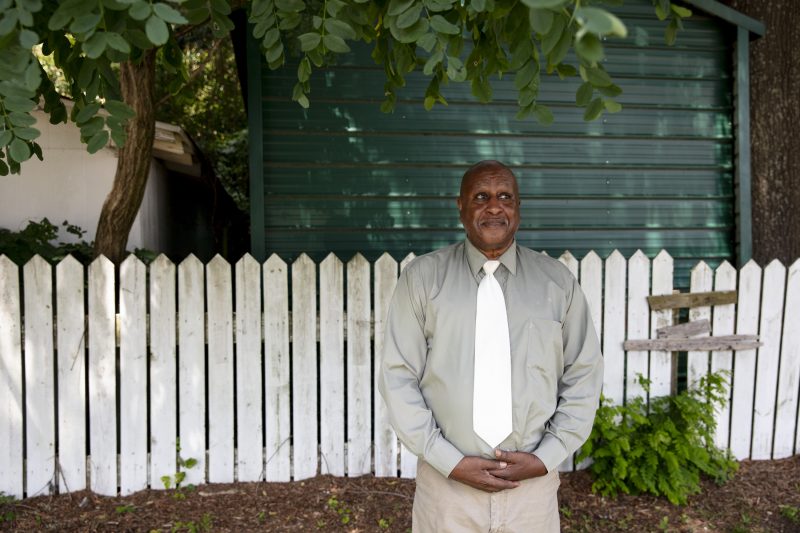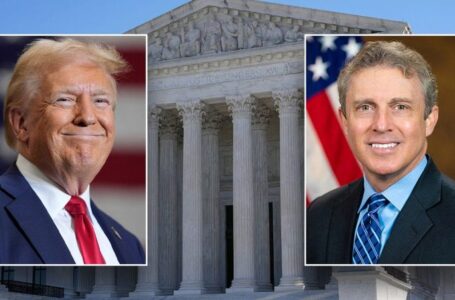JONATHAN TURLEY: Judge’s Special Counsel ruling may be the setback Trump admin was looking for
Black men helped power Biden’s 2020 Georgia win. Some are wavering.


MACON, Ga. — When the crush of inflation became too much to bear a year and a half ago, Rashad James and Justin Williams began hauling their smoker into an abandoned parking lot off Macon’s Route 41, dishing out $10 to $20 platters of pork chops, ribs and chicken four days a week.
That side hustle formed with family and friends — Smoke’s Grill — has provided a financial safety net for the two commercial truck drivers in an economy that has felt unrelenting. Both men cast ballots for Joe Biden in 2020, hoping he could usher in more opportunity, higher-paying jobs and less expensive health care for Black men like themselves. But this year they are undecided — frustrated by how little has changed nearly four years after Black voters helped Biden flip Georgia and gave Democrats control of the Senate by electing Raphael G. Warnock and Jon Ossoff in the 2021 Georgia runoff elections.
“Nothing’s changing. It feels like the economy is getting worse,” said James, 34, noting that everything has risen in price — from the green peppers and onions at his prep station to the plasticware they serve customers who pull up in pickup trucks during Macon’s lunch rush. Flipping chicken and wings as smoke billowed from the grill, Williams — who juggles a third job as a mobile DJ — said his decision about whom to vote for will come down to whether he concludes Donald Trump can improve the economy if he’s back in the White House.
“I’m kind of like: ‘Give him another chance. Let’s see,’” Williams, 36, said. “Because this is not going to cut it.”
The economy is doing well by many traditional measures. The Biden campaign has pointed to record-low Black unemployment during his administration, as well as policies intended to ease household costs, like ensuring more Black Americans are covered by health insurance and capping the price of insulin at $35 a month for seniors. But pessimistic views of the economy, like those expressed by Williams and James, are widespread even as inflation has cooled — confounding economists and frustrating the Biden campaign because it appears to be a major factor in his softening support.
The openness of some Black men to voting for Trump — despite his history of racist and offensive comments — is often rooted in the belief that the Biden administration has not done enough to ease their economic struggles. A defection by a significant number of them could be disastrous for Biden’s campaign.
Biden won 83 percent of Black men in Georgia, according to exit polls, when his slender 2020 victory made him the first Democrat to win the Peach State since 1992. Black men are a critical constituency this year in this and other battleground states, from Pennsylvania to Michigan, that Biden will need to win to retain the White House.But as polls show softening Democratic support within that voter group, Trump and his allies are courting onetime Biden voters like Williams and James — cognizant that even a small shift in a state like Georgia could mean the difference between winning and losing.
A Washington Post-Ipsos poll conducted in April found that 63 percent of Black men were certain to vote this year, down slightly from 68 percent in June 2020. About 7 in 10 Black men say they will “definitely” or “probably” vote for Biden this fall (69 percent) while 28 percent say the same for Trump, according to a Washington Post-Schar School poll of swing-state voters in six key states, including Georgia. Half say they will definitely not vote for Trump.
In Georgia, Black men favored Biden over Trump 76 percent to 20 percent in a head-to-head matchup in a Quinnipiac University poll from late May and early June. But 35 percent of Black men in Georgia said Trump would do a better job handling the economy and 32 percent of Black men said Trump would be better at addressing immigration issues, consistently two of the top concerns for voters in this campaign.
In more than two dozen interviews with Black men in Macon and the surrounding rural counties in middle Georgia, there were many voters like James and Williams who are undecided and conflicted about their choice in November.
They often expressed wariness of Trump — particularly his undeniable thirst for power and the role he played in the Jan. 6, 2021, attack on the U.S. Capitol. But there is also a deeply ingrained belief among many who spoke to The Post that Trump would act more aggressively than Biden to improve the economy. The struggle to keep up with rising prices has intensified many of those voters’ frustration with Biden’s handling of the influx of immigrantsinto the United States and the amount of money his administration is spending on aid to Ukraine and Israel.
The interviews also were conducted before last week’s presidential debate, where both Biden and Trump made direct appeals to Black voters but Biden also was heavily critiqued for an uneven performance. The president noted the growth in jobs and the number of small Black businesses during his time in office, as well as his efforts to reduce child-care costs and crack down on housing discrimination. He added that he didn’t blame Black voters “for being disappointed” because “inflation is hurting them badly.”
Trump interjected that Biden “caused the inflation — and it’s killing Black and Hispanic families.” But he also drew backlash on social media for claiming that Biden’s “big kill on the Black people” was “the millions of people that he’s allowed to come in through the border,” who the former president said are “taking Black jobs now.” Questions about what constitutes a “Black job” began trending on X, and economists noted there is no data to back Trump’s assertion.
Andra Gillespie, a political scientist at Emory University in Atlanta, said there is no evidence yet that a significant realignment of Black voters is taking place, calling polling data “noisy” with “lots of fluctuations.”But she said she will not be surprised if more Black men vote Republican this cycle, in part because of the masculine tone of Trump’s messaging, as he portrays himself as strong and powerful and mocks Biden as weak. In Gillespie’s own work, she has traced a gender gap between Black men and Black women — showing Black men to be less Democratic in their voting patterns — going back to 1972. The one year that was the exception: 2008, when Barack Obama ran to become the first Black president.
Sensing opportunity, the MAGA Inc. super PAC backing Trump’s bid began running ads this spring voiced by Black narrators on predominantly Black radio stations in the Macon media market — which encompasses the majority-Black Macon-Bibb County, surrounding rural counties, and the historic birthplaces of music greats like Little Richard and Otis Redding.
The radio ads echoed assertions that Trump has long made, claiming Biden’s policies have hurt Black Americans and that his would benefit them. Targeting moderate and conservative Black voters in a heavily Baptist area, the super PAC ads accused Biden of failing to rein in inflation, coddling immigrants and going too far to protect the rights of transgender people. “Keeping men out of girls’ sports and out of girls’ locker rooms is just common sense,” the narrator in one of the MAGA Inc. radio ads said.
MAGA Inc. then aired a TV ad in Macon featuring a Black narrator who tells a fictional Biden campaign worker that he won’t vote for the president again because of inflation and a claim that the administration is helping undocumented immigrants pay rent, which the Biden campaign said is false. (To back up the claim, MAGA Inc. pointed to a Michigan immigrant rent assistance program that relies, in part, on federal grants).
Quentin Fulks, the principal deputy campaign manager for the Biden campaign, dismissed the MAGA Inc. ads as offensive, charging that they peddle “some of the worst stereotypes” about the views of Black men.
“When you know that you don’t have a record to run on, even to consolidate your own base, you pivot to trying to spread disinformation and lies to their [your opponent’s] base in an effort to suppress the vote, sow doubt and create chaos,” said Fulks, who was Warnock’s campaign manager.
One of Biden’s challenges is that some of the Black men who are paying close attention in Macon are deeply disquieted by the influx of migrants at the U.S.’s southern border and the amount of money that his administration has committed to stopping Russia’s war in Ukraine.
Carling Colbert, a 61-year-old retired warehouse worker from Macon, described the inflow of immigrants over the last few years as his biggest disappointment after voting for Biden in 2020: “There’s too many people coming across the border, getting all the jobs and I don’t like that,” he said. “Trump was better on that. He tried to build the wall.” (Biden administration officials said Wednesday that the number of migrants crossing the southern border illegally has dropped more than 40 percent in the weeks since new restrictions on asylum claims were announced.)
Colbert also admitted with a rueful laugh that Trump’s ambitions remind him of Kim Jong Un, the North Korean leader: “He might become a dictator. I worry about that.”
Taylor Budowich, the CEO of MAGA Inc., argued that Biden “spent his first term putting illegals, criminals, and radical transgender activists in front of the issues that matter to all Americans — especially Black Americans.”
“President Trump wants to put Black America first,” he said. During a recent event at a Detroit church, Trump pointed to economic gains for Black Americans during his administration and vowed to reduce crime affecting that community by pushing for a greater police presence in a second term. He also touted his success in pushing through the sentencing reform measure known as the First Step Act.
For months, the Biden campaign has invested heavily in boosting its support among Black voters. Biden recently delivered the commencement address at Morehouse College, the historically Black, all-male institution in Atlanta. Late last month, his campaign launched “Black Voters for Biden-Harris” in Philadelphia to shore up support with more targeted messaging about the administration’s accomplishments. The intensive effort to reach Black voters this summer includes an eight-figure ad buy and voter outreach at summer festivals, concerts and other culturally relevant events that bring out high numbers of Black Americans.
In Macon, the Biden campaign countered MAGA Inc.’s messaging with an ad referencing Trump’s disrespectful language about Black Americans and the 1970s federal lawsuit that his real estate company faced for discriminating against Black families. The ad also argues Trump “stood with violent White supremacists” and notes that he warned of a bloodbath if he loses the next election.
The dueling campaign ads commanded the attention of Macon voters. Eighteen-year-old Jayden Owens, who was keeping an eye on five of his siblings at a Macon playground on a recent afternoon, said he initially believed Trump might be stronger on his top concern: crime. But then Owens heard Trump’s comments referencing a bloodbath: “I’m like, a bloodbath — if you don’t win the election? We don’t need that.”
Walter Smith, a 72-year-old former county commissioner from next-door Peach County, is worried that Trump’s messages are reshaping the views of Black male voters in his state who are not following politics closely: “He is a two-headed snake; he’ll say or do anything to persuade you,” Smith said of Trump, noting he changes the channel in disgust every time the MAGA Inc. television ads come on.
Still, he said Biden needs to be more aggressive: “You cannot forget the elementary things that you do,” Smith said. “Four years went by. You’ve got to go back out there, revisit these people and tell them what changes have been made.”
Johnny Houseworth, a 64-year-old retired bus driver and Army veteran from Macon, said he could never vote for Trump because he “gave the confederacy everything they wanted” and described the Jan. 6 attack on the Capitol as Trump’s effort “to start another Civil War.” Americans “can’t give him that much power” again, Houseworth said.
But Houseworth, who plans to back independent candidate Robert F. Kennedy Jr., described Biden as too ineffectual on the world stage — pointing to Vladimir Putin’s continuing aggression in Ukraine, as well as the civilian death toll in Gaza as examples of Biden’s limited influence on the actions of world leaders like the Russian president and Israeli Prime Minister Benjamin Netanyahu.
“He makes us look weak,” said Houseworth, who supported Biden four years ago. “You give [Ukraine] all this money; but you’ve got homeless people right here — and yet, you want to go over there and help other people?”
Kevin Brown, a 35-year-old who does electrical work and is in school to advance those skills, said he’s noticed more openness to Trump’s arguments this year among Black men — largely because of the attraction to Trump’s “business-savvy” at a moment when it feels difficult to get ahead: “A lot of people feel like he’s racist. I don’t feel like he’s racist. I just feel like he doesn’t go with the bulls—.”
“Sometimes it feels like [Biden] is just talking. It feels like nothing changing — things are getting worse,” Brown said, explaining why there is less stigma attached to supporting Trump in the Black community. “I did vote for [Trump] in 2016 — I didn’t tell anybody, but I did it,” he said.
This year, he said, he’ll probably do it again.
Emily Guskin and Scott Clement contributed to this report.











